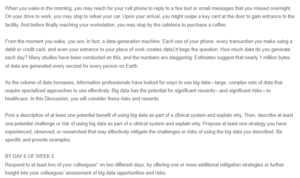Big Data Risks and Rewards Responses
Responding to Prisca
Hello Prisca,
This is an excellent post. As you have noted, the use of big data is accompanied by benefits, multiple challenges, and risks. You have noted that implementing robust security protocols in healthcare facilities, strict access controls, and user authentication mechanisms can improve the privacy and security of patient data. To expand on these mitigation strategies for the challenges and risks associated with the use of big data, it can be vital to improve knowledge and skills in cybersecurity and the management of big data by users. Most data privacy and security issues arise from the lack of awareness of the threats and how to protect oneself over the internet (Tawalbeh et al., 2020). User education on big data systems and safe utilization, including awareness of risk profiles, the need to update systems, and sticking to set security protocols, is a major aspect of internet etiquette. Internet etiquette defines safe behaviors within a digital environment created by the internet (Mamina & Pochebut, 2021). Additionally, user education and improved awareness of big data-related risks, threats, and prevention measures can improve the safety and security of patient data.
References
Mamina, R. I., & Pochebut, S. N. (2021). Digital etiquette and its specification (Philosophical and methodological aspect). Discourse, 7(2), 16–27. https://doi.org/10.32603/2412-8562-2021-7-2-16-27
Tawalbeh, L., Muheidat, F., Tawalbeh, M., & Quwaider, M. (2020). IoT privacy and security: Challenges and solutions. Applied Sciences 2020, Vol. 10, Page 4102, 10(12), 4102. https://doi.org/10.3390/APP10124102
Responding to Cyriacus
Hello Cyriacus,
This is a great post; I agree with you. The use of big data in healthcare settings presents significant benefits, challenges, and risks. As you have noted, the major benefits, challenges, and risks related to the use of big data come from the current advances in internet and internet-enabled devices. The increased adoption of such devices and internet consumption allows fast creation and collection of high volumes of wide-scope data and information. It has also improved the ability of healthcare providers to autonomously monitor and collect data from clients’ interconnected devices using advanced algorithms. Currently, unsupervised machine learning algorithms allow the continuous collection of big data without human intervention (Alloghani et al., 2020). Such machine-learning algorithms support the assimilation and evaluation of large amounts of diverse types of complex healthcare data (Ngiam & Khor, 2019). However, such advances present a question for ethics and the safety of the collected data. This is to say that the use of big data requires setting up advanced safeguards that counter the challenges and risks while improving the usability of big data.
References
Alloghani, M., Al-Jumeily, D., Mustafina, J., Hussain, A., & Aljaaf, A. J. (2020). A Systematic Review on Supervised and Unsupervised Machine Learning Algorithms for Data Science. 3–21. https://doi.org/10.1007/978-3-030-22475-2_1
Ngiam, K. Y., & Khor, I. W. (2019). Big data and machine learning algorithms for health-care delivery. The Lancet Oncology, 20(5), e262–e273. https://doi.org/10.1016/S1470-2045(19)30149-4
ORDER A PLAGIARISM-FREE PAPER HERE
We’ll write everything from scratch
Question

Big Data Risks and Rewards Responses
When you wake in the morning, you may reach for your cell phone to reply to a few text or email messages that you missed overnight. On your drive to work, you may stop to refuel your car. Upon your arrival, you might swipe a key card at the door to gain entrance to the facility. And before finally reaching your workstation, you may stop by the cafeteria to purchase a coffee.
From the moment you wake, you are, in fact, a data-generation machine. Each use of your phone, every transaction you make using a debit or credit card, and even your entrance to your place of work creates data. It begs the question: How much data do you generate each day? Many studies have been conducted on this, and the numbers are staggering: Estimates suggest that nearly 1 million bytes of data are generated every second for every person on Earth.
As the volume of data increases, information professionals have looked for ways to use big data—large, complex sets of data that require specialized approaches to use effectively. Big data has the potential for significant rewards—and significant risks—to healthcare. In this Discussion, you will consider these risks and rewards.
Post a description of at least one potential benefit of using big data as part of a clinical system and explain why. Then, describe at least one potential challenge or risk of using big data as part of a clinical system and explain why. Propose at least one strategy you have experienced, observed, or researched that may effectively mitigate the challenges or risks of using the big data you described. Be specific and provide examples.
BY DAY 6 OF WEEK 5
Respond to at least two of your colleagues* on two different days, by offering one or more additional mitigation strategies or further insight into your colleagues’ assessment of big data opportunities and risks.


